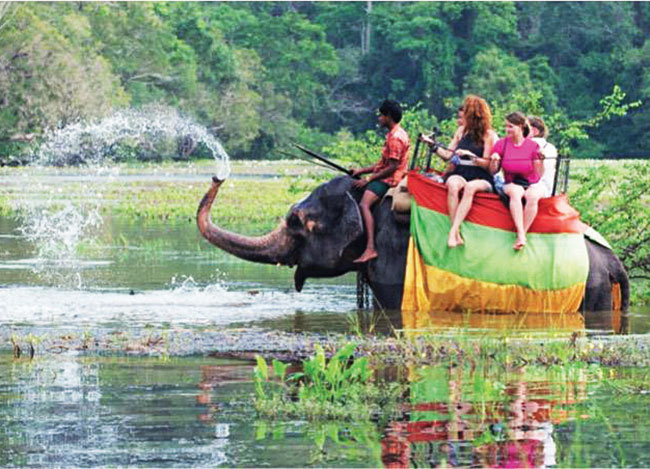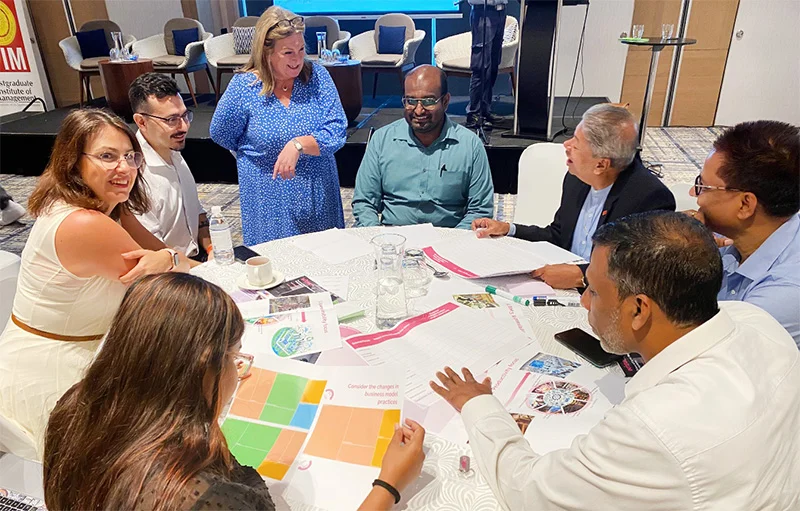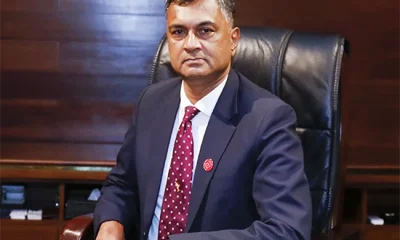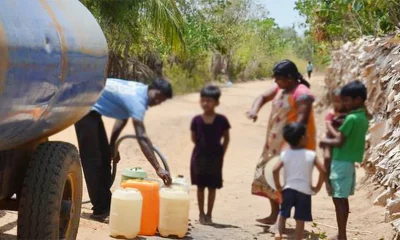Business
Tourism industry stakeholders urged to strictly adhere to health protcols

Tourism Industry operators and stakeholders must ensure accountability with strict adherence to the protocols and mechanisms laid down to ensure the recovery of the industry. This is the time Industry should come together, work together and ensure Sri Lanka will have a steady yet continued recovery both for the sake of the country, communities and the industry at large, the Sri Lanka Tourism Promotion Bureau said in a press release.
The release further said:
Tourism was one of the fastest growing sectors in Asia and is the third largest foreign exchange earner in Sri Lanka. When the Covid-19 pandemic surfaced in 2020, tourism was the one to face the immediate impact and one of the industries to be strained the most. Sri Lanka first went into lockdown including the airport closure in March 2020 to control the spread of the virus. The tourist arrivals globally fell abruptly for the first time in the history of tourism and came to a complete halt for a period of 10 months till 21st January 2021. This comes at a situation when the Sri Lankan Tourism industry was suffering from the negative impacts of the Easter attack. Thus from 2019 onwards the industry has not been able to function in full operation. Resulting in two Bear winter seasons in 2019 and 2020. Thus the need to recover fast, steady yet in a prudent manner.
Sri Lanka was one of the very few to open up for Tourism during this time under the protection of a ‘Tourism Bio Bubble’ operation put in place by Sri Lanka Tourism which has been recognized and acknowledged globally as an innovative concept to resume tourism in the new normal operations.
Tourism Bio-Bubble included 3 pillars of ‘Safe and Secure Hotels’, ‘Tourism Operational Guidelines’ and ‘Safety Guidelines for visitors’ (refer picture 1). It is this Bio-Bubble concept that won Sri Lanka many accolades to include ‘Safe Travel Stamp from the World Travel & Tourism Council’, ‘Top Country’ for Winter Travel for 2020 by ‘USA Today’, ‘Best place to visit in 2020’ by CNN, ‘Top Destination to Travel’ by Condé Nast Traveller in 2020, Sri Lanka listed as one of the best holiday destinations for 2020 by The Times, UK and Wanderlust Travel Awards 2020 in London where Sri Lanka wins “Back on the Map” award.
 While Other Asian tourist destinations remained closed for tourists till recently, Sri Lanka commenced the revival of the tourism industry through the creation of the Tourism Bio Bubble. Sri Lanka is also one of the first in the Asian region to prepare and issue a detailed COVID-19 Health Protocol for the Industry.
While Other Asian tourist destinations remained closed for tourists till recently, Sri Lanka commenced the revival of the tourism industry through the creation of the Tourism Bio Bubble. Sri Lanka is also one of the first in the Asian region to prepare and issue a detailed COVID-19 Health Protocol for the Industry.
Despite this readiness by the local Tourism industry, the world suffered several travel bans, suspension of flights and lockdowns due to pandemic waves that surfaced time to time further restricting global travel.
After a period of 3 plus months of Tourism re-opening, Sri Lanka again went into another lockdown period. With the rise of Covid-19 cases reported daily, Sri Lanka was listed on the red list in UK and most EU countries, USA had travel advisories imposed. This was a blow to the recovery of tourism industry.
However, given the strong vaccination drive by the government and the prudent health controls in place, Sri Lanka was able to curtail the spread and to reopen for Tourism once again on 1st June 2021. Revisions to bio-bubble operations were made to adapt to the developments in both local and global vaccination programs and global best practices. However Sri Lanka Tourism, under the guidance of the Ministry of Health has been adopting a prudent operational mechanism for the industry with relaxations offered on health recommendations. With the successful government vaccination program and constant communication of progress to educate overseas missions locally, Sri Lanka was able to be gradually removed from red lists published by UK.
Furthermore, travel restrictions were also eased prudently allowing fully vaccinated visitors to travel with less restriction from 1st October 2021. As echoed by the industry ever since the easing of the health restrictions we have seen a gradual increase in the bookings and flights which is an indication of a gradual pick up and the much needed economic and foreign exchange boost.
Business
CEB urged to revise Draft Long Term Generation Expansion Plan, in view of renewable energy needs

By Ifham Nizam
The Public Utilities Commission of Sri Lanka (PUCSL) has instructed the Ceylon Electricity Board (CEB) to revise its Draft Long-Term Generation Expansion Plan (LTGEP) 2025-2044, incorporating more robust projections for renewable energy and battery storage, while also reassessing LNG infrastructure and procurement strategies.
The Island Financial Review reliably learns PUCSL Director General Damitha Kumarasinghe emphasized the need for “more robust and realistic cost assumptions for Renewable Technologies and Battery Energy Storage Systems (BESS).”
The Commission stressed that BESS should be valued not just as a renewable integration tool but also for its potential to mitigate power shortages.
The directive also calls for revisions in LNG infrastructure planning, including “a comprehensive analysis covering LNG fuel cost calculation, infrastructure development, procurement contracting options, and risks associated with supply and procurement.” PUCSL has specifically highlighted the importance of evaluating the financial and economic feasibility of a natural gas pipeline from Kerawalapitiya to Kelanitissa.
Kanchana Siriwardena, Deputy Director General – Industry Services, reinforced the Commission’s stance on renewable energy, stating that “further reductions in renewable energy curtailment should be explored by incorporating more BESS.”
The PUCSL’s instructions also mandate incorporating clauses from the Memorandum of Understanding (MoU) with Petronet India, which includes a temporary LNG supply for the Sobadhanavi Plant. The revised LTGEP must also factor in infrastructure costs related to the Floating Storage Regasification Unit (FSRU) and pipeline networks as part of the overall LNG cost calculation.
The CEB is expected to resubmit the revised plan for PUCSL’s approval, ensuring alignment with Sri Lanka’s long-term energy security and sustainability goals.
The PUCSL directive also calls for a comprehensive evaluation of various LNG procurement options and associated risks. These include:
LNG infrastructure development and expansion
Contracting options for LNG procurement
Risks related to LNG supply and procurement stability
Robustness of natural gas demand calculations
Economic feasibility of the proposed natural gas pipeline from Kerawalapitiya to Kelanitissa, given the low plant factors of power stations at Kelanitissa.
Business
Nations Trust Bank ends 2024 with strong performance, achieving 24% ROE

Nations Trust Bank PLC reported strong financial results for the twelve months ending 31st December 2024, achieving a Profit After Tax (PAT) of LKR 17 Bn, up 46% YoY.
Nations Trust Bank, Director & Chief Executive Officer, Hemantha Gunetilleke, stated, “The Bank’s performance for the twelve months ending 31st December 2024 showcases our continued growth and expansion across diverse customer segments. Our solid capital position, strong liquidity buffers, effective risk management frameworks, and steadfast commitment to service excellence and digital empowerment remain the key drivers of our success.”
Improvements in the macro-economic environment and successful management of the Bank’s credit portfolio resulted in total impairment charges decreasing by 69% and the Net Stage 3 ratio reducing to 1.6%.
The Bank’s financial performance is supported by its strong capital buffers, with Tier I Capital at 21.47% and a Total Capital Adequacy Ratio of 22.66%, well above the regulatory requirements of 8.5% and 12.5%, respectively.
A strong liquidity buffer was maintained with a Liquidity Coverage Ratio of 320.56% against the regulatory requirement of 100%.
The Bank reported a Return on Equity (ROE) of 24.22%, while its Earnings Per Share for the twelve months ending 31st December 2024 increased to LKR 50.82, against LKR 34.70 recorded during the same period last year.
Nations Trust Bank PLC serves a diverse range of customers across Consumer, Commercial and Corporate segments through multi-channel customer touch points spanning both physical and digital. The Bank is focused on digital empowerment through cutting-edge digital banking technologies, and pioneered FriMi, Sri Lanka’s leading digital banking experience. Nations Trust Bank PLC is an issuer and sole acquirer of American Express Cards in Sri Lanka with market leadership in the premium segments.
Business
Modern Challenges and Opportunities for the Apparel Industry: JAAF drives industry dialogue

The Joint Apparel Association Forum (JAAF), in collaboration with Monash Business School and the Postgraduate Institute of Management (PIM) successfully hosted the International Conference on the Apparel Industry 2025 recently in Colombo. This was the second time the event was held, following its inaugural edition in 2018, as part of JAAF’s commitment to fostering dialogue and collaboration within the global apparel sector.
Themed “Modern Challenges and Opportunities for the Apparel Industry”, the three-day event brought together industry leaders, academics, and sustainability experts to discuss pressing issues such as ESG (Environmental, Social, and Governance) compliance, circular economy strategies, technological advancements, and workforce transformation.
A key highlight of the event was the panel discussion on “Current Actions and Their Impact on ESG-Related Outcomes in the Apparel Industry,” featuring:
Felix A. Fernando – CEO, Omega Line Ltd.
Nemanthie Kooragamage – Director Group Sustainable Business, MAS Holdings
Gayan Ranasinghe – Control Union,
Chamindry Saparamadu – Director General/CEO, Sustainable Development Council
Pyumi Sumanasekara – Principal Partner, KPMG Sri Lanka
Discussions emphasized how Sri Lanka’s apparel industry is adapting to global ESG standards, incorporating sustainable production methods, and aligning with evolving regulatory frameworks.
-

 Business2 days ago
Business2 days agoSri Lanka’s 1st Culinary Studio opened by The Hungryislander
-

 Sports6 days ago
Sports6 days agoSri Lanka face Australia in Masters World Cup semi-final today
-

 Sports3 days ago
Sports3 days agoHow Sri Lanka fumbled their Champions Trophy spot
-

 News6 days ago
News6 days agoCourtroom shooting: Police admit serious security lapses
-

 News6 days ago
News6 days agoUnderworld figure ‘Middeniye Kajja’ and daughter shot dead in contract killing
-

 News5 days ago
News5 days agoKiller made three overseas calls while fleeing
-

 Features3 days ago
Features3 days agoThe Murder of a Journalist
-

 News4 days ago
News4 days agoSC notices Power Minister and several others over FR petition alleging govt. set to incur loss exceeding Rs 3bn due to irregular tender




















